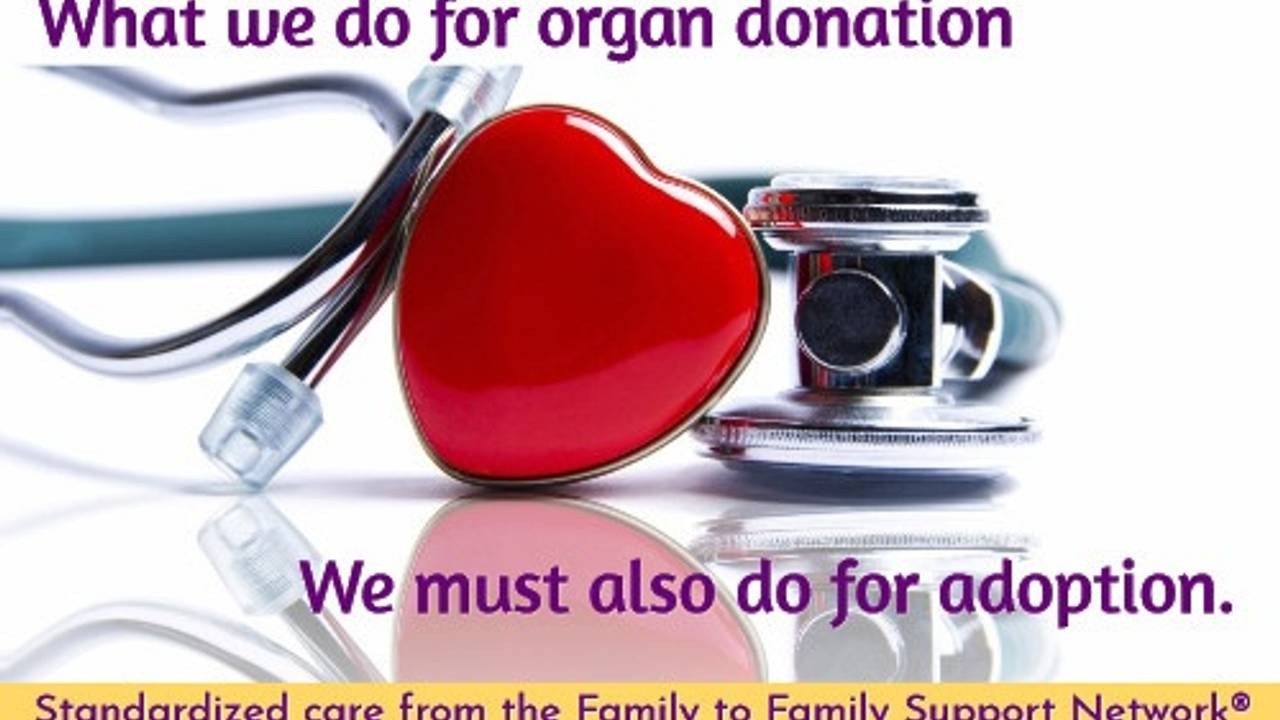Transplanted Kidneys Get Standardized Care. Why Don't Babies?
Nov 20, 2019
Why are kidney more important than newborn babies?
Awhile back, I was working full time as the Adoption Liaison at Parker Adventist Hospital in Douglas County, Colorado. We had created the first and only hospital-based adoption support program in the nation and it was my job to connect with families involved in potential adoption placements -- always the patient who was delivering a newborn and sometimes the person/couple who was hoping to adopt.
I got curious about standard procedures around organ donation, a process that also connects two families under highly emotional circumstances. As I investigated, my jaw dropped, and I'll tell you why in a moment.
I learned that a specially trained donation coordinator would be called in to talk to the family. Nurses and other healthcare professionals were not allowed to address the organ donation decision with the patient or the patient's family.
I asked why hospital staff weren’t allowed to be involved in such an important situation. The answer was three-fold. So that:
- there is no coercion;
- all families get the same information;
- all families have support in the hospital during this time of loss.
Now here comes the jaw drop. Hospital staff nationwide offer neutral support to families in organ donation, yet I was the only hospital staff person in the entire country providing similar support to families in adoption-situations. Why? Babies seem as important as organs, don't you think?
Let's explore the reasons for having organ donation coordinators.
1. To Prevent Coercion
If there is concern that families will be given misinformation regarding organ donation, how much more should we be concerned when there are ten$ of thousand$ of dollar$ changing hands in domestic infant adoption? I trained at a hospital in Utah recently and a nurse said,
I know there is trafficking of babies going on here, but we don’t know enough to stop it. The “adoption professionals” tell these Moms that they will come back to the hospital at the 24-hour mark to have them sign their papers. I never knew that was the minimum amount of time. I wonder if these Moms even know they don’t have to sign away their rights immediately at 24 hours?
~~ Utah Nurse
This nurse was right to wonder. She was right to question whether the Mom she was caring for -- possibly one of so many who coordinate their adoption placements over the internet -- truly knew her rights.
2. To Manage the "Wedding & the Funeral"
Think of any hospital-based TV drama. There are going to be episodes about organ donation because...DRAMA. It's such an emotional time in the hospital for the people on both sides. A family making the decision for organ donation is facing a devastating loss -- no one would argue with that.
You could likewise foresee that a Mom who chooses adoption is also entering into a grief that will be lifelong, unpredictable, and life altering. While she may see the positive side of her loss, as I imagine many feel in the redemptive fact that their love one lives on through organ donation, it does not diminish the void felt in her heart that may affect her the rest of her life. Birth fathers, too, may feel this grief.
In organ donation – one family going through the loss of their beloved and the other celebrating the gain of their beloved -- the parties do not cross paths in the hospital corridors. Yet with the popularity of pre-birth matches and the possibility of the adopting families on site during or shortly after delivery, there can be days of intense emotional interactions. Nurses and doctors and other hospital staff are on the front lines with no training in this complex situation.
How are nurses and other healthcare professionals expected to manage all these emotions while maintaining a high level of clinical care? To do so well, they need standardized training, just like what is done with organ donation.
3. To Set the Trajectory for Lifelong Impact
We know that organ donation changes the future for two families. One family is steeped in loss, one family benefits from their selfless decision, and we can recognize that one does not negate the other. Understanding the grieving process can help people on both ends of this decision with their life's trajectory.
Similarly, those of us who have brought home a child through adoption know there is deep intense pain behind the joy in our family -- the loss for our child of their parents and the loss for the parents that have said goodbye to their role as parents. Trained hospital personnel who understand the "wedding and the funeral" emotions can help the families better feel their emotions and begin the journey of healing.
Again, I Ask Why?
The recent story of the child trafficking scheme coordinated by Paul Petersen in Utah, Arizona, and Arkansas motivated me all the more to continue to advocate for standardized care coordination in all hospitals for women considering adoption. I would bet that the large majority of those babies born from Marshallese women were delivered in hospitals in the United States surrounded by nurses and doctors who would have advocated for their rights had they known how to do so.
So How Do We Raise the Bar?
When looking at the historical intersection of healthcare and infant adoption, it takes only moments to find books like The Girls Who Went Away and The Baby Thief: The Untold Story of Georgia Tann. We see hospitals have not always been advocates for women, education, or families.
As I advocate for hospitals around the country to implement our Unique Families Program® as the standard of adoption-sensitive care, I still see hospitals throw up their hands and proclaim it is not their job to police infant adoption.
Then why have concerns for an organ donation? Why fund a full-time position within your walls to address one type of loss, yet not another?
If we provide support in organ donation because it clinically takes place within the walls of the hospital, because there is concern for coercion and misinformation, and because it is an emotional life changing event for multiple families, then we owe the same safeguards in place for those considering and pursuing infant adoption.

